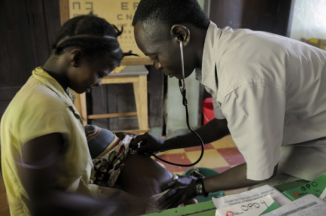Founded in 1971 by 13 doctors – including former French Foreign Minister, Bernard Kouchner – the organization is presently active in 68 countries, with operations encompassing close to 32,000 staff.
A key factor in the ability of Médecins Sans Frontières to ‘bear witness’ and take sometimes controversial ethical stands against governments and other actors is its funding model, which unlike most major humanitarian NGOs is predominantly based around private donations rather than institutional grants (the former representing 89 percent of total income in 2011). This independence, which often extends to a tendency to avoid collaboration in the context of its strategic interventions, has at times led to criticism of a pervasive ‘lone crusader’ attitude.
Nonetheless, never in question is the impact of the organization’s operations, which range from addressing the ravages of armed conflict, to emergency action to stem the spread of epidemics in situations of state incapacity.
Médecins Sans Frontières has also been innovative in its approach to dealing with operational challenges, establishing the ‘Access Campaign’ to reduce prices for medicines, diagnostics and vaccines and stimulate the development of improved treatments, setting up affiliated organization, Epicentre, to conduct epidemiological research and assessments, and partnering in the Drugs for Neglected Diseases initiative.
(Presented by http://theglobaljournal.net/group/top-100-ngos/)
